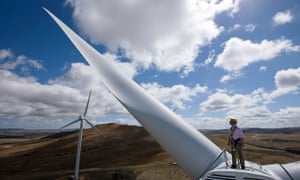Extract from The Guardian
Steven Skala flags potential asset recycling to ensure there is ‘no significant constraint’ on investment capacity
The Clean Energy Finance Corporation has signalled it may accelerate reinvestment in clean energy projects to help plug gaps in the market.
In the CEFC’s annual report, tabled in federal parliament on Wednesday, the chairman of the organisation, the investment banker and company director Steven Skala, flagged potential asset recycling to ensure there is “no significant constraint on … investment capacity”.
The CEFC – a government body mobilising capital investment in renewable energy, low-emission technology and energy efficiency – reported it had made cumulative investments of more than $6.6bn, comprised of loans and equity.
The organisation’s investments recoup costs plus a margin – it does
not allocate grants. The organisation had a budget of $10bn, with $4.7bn
remaining.In the CEFC’s annual report, tabled in federal parliament on Wednesday, the chairman of the organisation, the investment banker and company director Steven Skala, flagged potential asset recycling to ensure there is “no significant constraint on … investment capacity”.
The CEFC – a government body mobilising capital investment in renewable energy, low-emission technology and energy efficiency – reported it had made cumulative investments of more than $6.6bn, comprised of loans and equity.
Skala declared that decarbonisation was inevitable, despite the fact the Morrison government dumped the national energy guarantee’s emissions reduction target after Malcolm Turnbull lost the leadership, fuelling concerns the lack of policy certainty could slow the pace of transformation in the energy market.
He noted there had been a significant shift in business and the financial markets over the past 12 months. “This year has seen industry seizing the challenges and opportunities offered by decarbonisation, and accelerating its consideration of emerging duties associated with carbon disclosure.
“The financial markets have also moved in this regard. The question now is not one of direction, but of pace.”
The mechanism driving much of the transformation in the absence of Labor’s carbon price, repealed by Tony Abbott upon coming to government in 2013, has been the renewable energy target.
The RET is due to scale down from 2020 and there is currently no policy to replace it. The national energy guarantee, with a legislated emissions reduction of 26% for the electricity sector, was supposed to be the replacement but the policy was a casualty of the government’s leadership implosion.
Despite that uncertainty, Skala said the outlook suggested the CEFC would continue to have “a significant number of opportunities available in its investment pipeline” and it would continue to “examine market gaps in clean energy investment”.
The CEFC was recently asked in Senate estimates whether it would pay a dividend to the Australian Renewable Energy Agency out of any of its retained earnings.
The Greens senator Sarah Hanson-Young noted that Arena – a separate agency that allocates grants to assist the transition to renewable energy – had suffered a budget cut of $500m. The CEFC’s chief executive, Ian Learmonth, told the committee: “No formal request for that money to go Arena’s way.”
Learmonth implicitly cautioned against the idea. “While it’s capital inside the CEFC and being reinvested into projects, it continues to make a return for taxpayers.
“If it’s transferred to Arena, it would be an expense to the government because it’s a grant-making organisation.”

No comments:
Post a Comment